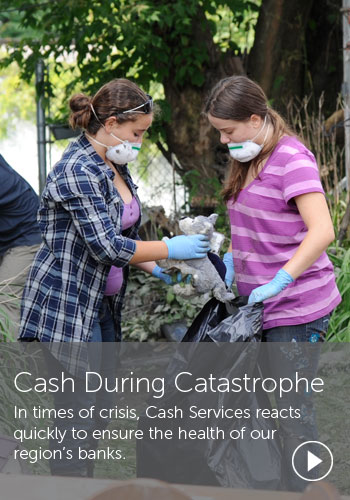Cash During Catastrophe
In times of crisis, Cash Services reacts quickly to ensure the health of our region's banks.
After Hurricane Irene tore through Vermont on August 28, 2011, floodwaters rose relentlessly, causing billions of dollars in damage. The fierce storm washed away homes, tore apart roads, ruined bridges, and shuttered businesses for days.
Even banks weren’t immune; some, in fact, were literally underwater for days. “The basement completely flooded, and the water rose to about three feet on the first floor,” recalls Wendy Kellett, branch manager of the Northfield Savings Bank in Waterbury, Vermont. “The water was over our desks.”
As the “bank for banks,” the Federal Reserve System is responsible for supplying currency to financial institutions throughout the nation. Never is this mission more critical than in times of duress, such as power outages, large-scale computer system failures, or natural disasters, such as Hurricane Irene.
“In emergency situations, people tend to turn to cash in case their credit cards or debit cards are not accepted due to power outages,” says Leah Maurer, Vice President of Cash Services at the Federal Reserve Bank of Boston. “Cash is always the backup option, and the need for cash surges during emergencies.
“Being able to supply cash to our customers—at any time and under any conditions—is very important to the Cash community, not just in Boston but throughout the Fed System,” adds Maurer. “We work very hard to make sure that we’re able to provide continuous service for our customers through any kind of emergency situation, whether it’s floods, blizzards, hurricanes, tornadoes, ice storms, or power outages.”
So in the aftermath of Hurricane Irene, the Boston Fed, which serves the New England region, stood ready to supply Vermont’s banks with an influx of cash should the need arise. While banks were tested by the hurricane, the Green Mountain State’s bankers proved resilient and were able to support one another during the crisis.
“The Vermont bankers relied a lot on themselves and on their neighboring banks,” recalls Maurer. “In one instance, two competing banks shared a branch location because one of the banks was flooded. They pooled their resources, and as a result we didn’t have to step in.”
The Boston Fed supported Vermont banks in their cleanup efforts, which consisted of accepting, destroying, and replacing approximately $700,000 in water-logged currency. The acceptance process for damaged currency is an exacting one, involving a Cash Services team that physically handles the contaminated currency, an independent witness from the Cash Services department, a Cash Services executive, and an auditor at the Fed.
It took several weeks for the money to trickle in, as bankers did their best to dry the currency on their own, often in creative ways. One bank used a fan in an attempt to blow-dry currency. “We rented a clothes dryer, dried all the bills, and pressed them flat to get them ready to be sent out,” says the Northfield Savings Bank’s Kellett, who jokingly adds, “It put a whole new spin on money laundering.”
According to Cash Services Manager Bob Costello, the Boston Fed accepted 56,479 contaminated paper notes, most from Vermont, during September, October, and November 2011—approximately sixty times the amount of damaged currency that Cash Services received during the same period the previous year.
In case of an extreme event that knocks out the Boston Fed’s systems, the Bank is part of a System-wide “buddy bank” arrangement, whereby neighboring Reserve Banks can fill orders for customers in another district. The New York and Philadelphia Reserve Banks can supply cash from their vaults for Boston’s First District customers, while Boston and other Reserve Banks can do likewise for the Second (New York) and Third (Philadelphia) Districts.
The buddy-bank arrangement is just one element in Cash Services’ continuity planning, a multifaceted, System-wide effort that includes multiple tests of systems, equipment, and people each year. Despite all the advances in technology, however, first and foremost, the Cash Services operation relies on good people.
In an emergency such as the Vermont flooding, a core group of Cash Services employees might be called upon to stay overnight or work weekends, ensuring that the Boston Fed is able to supply cash to customers when needed.
“We make sure that the right staff are available to fill orders and to take deposits during emergencies, and we also ensure that management is in place to support them,” says Maurer.
“Most of our people have worked here for decades and know each other very well, so we have an unusually close-knit group in Cash,” says Costello, who has been with the Bank for almost forty years. “The nature of the work is extremely team-oriented, and work partners truly depend upon each other. So we really have a ‘one for all and all for one’ mentality; we’re almost like a family.”
